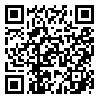1. Darvishzadeh K, Dasht Bozorgi Z. Relationship between the resilience and psychological hardiness with the spiritual intelligence in a sample of female students. Indian Journal of Public Health Research & Development. 2017;8(1):222–6. [
DOI]
2. Safari H, Jenaabadi H, Salmabadi M, Abasi A. Prediction of academic aspiration based on spiritual intelligence and tenacity. Education Strategies in Medical Sciences. 2016;8(6):7–12. [Persian] [
Article]
3. Mahmodiyan H, Abbasi M, Pirani Z, Shahali Kaborani F. The role of emotional, cognitive and behavioral enthusiasm in predicting academic burnout students. Biquarterly Journal of Cognitive Strategies in Learning. 2018;6(10):197–206. [Persian] [
DOI]
4. Azizinejad B, Allah Karami F. Comparing the effect of ICT-based education with traditional education on students’ academic enthusiasm. Technology of Education Journal (TEJ). 2018;13(1):203–12. [Persian] [
DOI]
5. Lopez C, Jones SJ. Examination of factors that predict academic adjustment and success of community college transfer students in STEM at 4-year institutions. Community College Journal of Research and Practice. 2017;41(3):168-82. [
DOI]
6. Mirzaee E, Jafari Harandi R. Predicting of academic performance from psychological capital and psychological hardiness. Journal of Educational Psychology Studies. 2020;17(39):144–123. [Persian] [
Article]
7. Sadri Damirchi E, Karimaianpoor G, Jalilan S. Prediction of academic buoyancy based on perception of learning environment and psychological hardiness in medical sciences student. Education Strategies in Medical Sciences. 2017;10(5):364–74. [Persian] [
Article]
8. Shawyer F, Farhall J, Thomas N, Hayes SC, Gallop R, Copolov D, et al. Acceptance and commitment therapy for psychosis: Randomised controlled trial. Br J Psychiatry. 2017;210(2):140–8. [
DOI]
9. Levin ME, Pistorello J, Hayes SC, Seeley JR, Levin C. Feasibility of an acceptance and commitment therapy adjunctive web-based program for counseling centers. J Couns Psychol. 2015;62(3):529–36. [
DOI]
10. McCracken LM, Vowles KE. Acceptance and commitment therapy and mindfulness for chronic pain: model, process, and progress. Am Psychol. 2014;69(2):178–87. [
DOI]
11. Lali O. Asarbakhsi darman mobtani bar paziresh va ta’ahod ACT bar sarsakhti ravanshenasi va sazegari ejtemaie daneshamoozan Dokhtar mantaghe Koohsorkh shahr Rivash [The effectiveness of ACT-based acceptance and commitment therapy on psychological hardiness and social adjustment of female students in the Koohsorkh area of Rivash city]. In: The 4th National Conference on Counseling and Mental Health. Qouchan, Iran: Islamic Azad University, Qouchan Branch; 2016. [Persian]
12. Adham A. Asarbakhshi darman paziresh va ta’ahod bar tabavari va sarsakhti ravanshenakhti bimaran mobtala be ekhtelal dard [The effectiveness of acceptance and commitment therapy on resilience and psychological hardiness in patients with pain disorder]. In: The 2nd Knowledge and Technology Conference of Psychology, Educational Sciences and Sociology of Iran [Interent]. Tehran, Iran: Civilika; 2018. [Persian] [
Article]
13. Motamedi H, Samavi A, Fallahchai R. Effectiveness of group-based acceptance and commitment therapy vs group-based cognitive-behavioral therapy in the psychological hardiness of single mothers. Journal of Research and Health. 2020;10(6):393–402. [Persian] [
DOI]
14. Grégoire S, Lachance L, Bouffard T, Dionne F. The use of acceptance and commitment therapy to promote mental health and school engagement in university students: A multisite randomized controlled trial. Behav Ther. 2018;49(3):360–72. [
DOI]
15. Fang S, Ding D. The efficacy of group-based acceptance and commitment therapy on psychological capital and school engagement: A pilot study among Chinese adolescents. Journal of Contextual Behavioral Science. 2020;16:134–43. [
DOI]
16. Kobasa SC. Stressful life events, personality, and health: an inquiry into hardiness. J Pers Soc Psychol. 1979;37(1):1–11. [
DOI]
17. Schaufeli WB, Salanova M, González-Romá V, Bakker AB. The measurement of engagement and burnout: A two sample confirmatory factor analytic approach. Journal of Happiness Studies. 2002;3(1):71–92. [
DOI]
18. Abdollahi A, Talib MA, Yaacob SN, Ismail Z. Problem-solving skills and hardiness as protective factors against stress in Iranian nurses. Issues Ment Health Nurs. 2014;35(2):100–7. [
DOI]
19. Na’ami AZ, S Piriaei. Rabeteye abad angizesh tahsili ba eshtiaq tahsili danesh amoozan sal sevom dabirestan–haye shahre Ahvaz [Relationship between academic motivation and academic engagement of third-year high school students in Ahvaz city]. Research in Educational Systems. 2012:6(16):29–42. [Persian] [
Article]
20. Hayes SA, Orsillo SM, Roemer L. Changes in proposed mechanisms of action during an acceptance-based behavior therapy for generalized anxiety disorder. Behav Res Ther. 2010;48(3):238–45. [
DOI]
21. Wynd CA, Schmidt B, Schaefer MA. Two quantitative approaches for estimating content validity. West J Nurs Res. 2003;25(5):508–18. [
DOI]
22. Pourabdol S, Sobhigharamaleki N, Bastami M, Ghazanfari H. The effect of acceptance and commitment therapy in decreasing academic procrastination among students with Specific Learning Disorder (SLD). Biquarterly Journal of Cognitive Strategies in Learning. 2016;4(6):157–70. [Persian] [
DOI]
23. Mashkbid Haghighi M, Pooryousefi M. Asar amoozesh mobtani bar paziresh va ta’ahod bar sarsakhti ravanshenakhti, ezterab madaran daraye koodakan ba moshkelat ezterabi [The effect of acceptance and commitment therapy education on psychological hardiness and anxiety of mothers with children with anxiety problems]. Contemporary Psychology. 2017;12(Supp 1): 1595–600. [Persian]
24. Luoma JB, Vilardaga JP. Improving therapist psychological flexibility while training acceptance and commitment therapy: a pilot study. Cogn Behav Ther. 2013;42(1):1-8. [
DOI]





